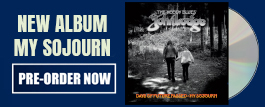 Justin Time: An Interview With The Moody Blues’ Hayward
Justin Time: An Interview With The Moody Blues’ Hayward
April 6, 2012
In another time – and another galaxy – The Moody Blues might have been a (shudder) popular boy band. Screaming female fans? Check. Catchy melodies and graceful lyrics? Check. Charismatic frontmen and backmen? Check. Thank goodness that the progressive rock pioneers were around to change music history in our galaxy long before any of those “Justin come latelies” were even born.
The legendary band is currently touring the U.S. on a 32-city circuit titled “The Moody Blues: The Voyage Continues – Highway 45”, in conjunction with the 45th Anniversary of their landmark album, Days of Future Passed.
Since the release of the definitive record, guitarist/vocalist Justin Hayward and his bandmates, bassist/vocalist John Lodge and drummer Graeme Edge, have sold an extraordinary 70 million albums worldwide and been awarded an astonishing 14 multi-platinum, platinum and gold discs, making them one of the top-grossing album and touring bands in existence – and giving them enough precious metal to rival Fort Knox.
Their infinite roster of hits is nothing less than the soundtrack of a success story spanning four decades of musical brilliance: “Nights In White Satin,” “Tuesday Afternoon,” “Ride My See Saw,” “The Story In Your Eyes,” “Isn’t Life Strange,” “Question,” “I’m Just A Singer (In A Rock And Roll Band),” “Your Wildest Dreams,” and “I Know You’re Out There Somewhere,” to name a few.
The Moodies’ remarkable legacy of chart toppers has produced sold-out tours on a consistent basis over their storied career – and if the 2012 tour is any indication, the sell-outs won’t be ending anytime soon. There’s a reason why they call it “timeless music.”
It might be tempting to dismiss them as a band whose days of future have passed, but appreciative fans at recent shows have loudly begged to differ. The Moodies’ enduring sound continues to thrill baby-boomers, generation X’ers and Y’ers – in other words, nothing less than the whole alphabet.
As the rock icons prepared for the tour, Hayward was kind enough to chat with Examiner about the band’s lasting legacy of amazing music. The guitarist/vocalist’s introspective lyrics and well-crafted melodies have made him much more than “just a singer in a rock and roll band.”
His prodigious songwriting gifts might lead you to believe that he’s able to summon inspiration at will. But Hayward confesses that it’s a bit more complicated for him.
“I think it’s Picasso that said, ‘Inspiration’s got to find you working.’ So I play every day. And I find the more I play – and the more I just doodle and practice – the more I write. If I don’t doodle and practice, I don’t write. So, I don’t find inspiration a problem because I tend not to question it, where it’s gotta come from. But it’s certainly a pleasure and I find it rather cathartic, really.”
“You’re very lucky to have two kinds of work. One work you can have is that experience of writing and then recording. And then the other is to be able to do gigs, which is the most honest kind of living that I can think of. You turn up, you shut up, you play, you get paid, you leave – and it all happens within twelve hours.”
Hayward is a complete artist, able to craft a masterful melody intertwined with insightful lyrics – and matchlessly deliver the tune, be it live or in the studio. And while songwriting and performing both have their rewards, each offers something separate and distinct for a musician.
“They’re very different experiences. Writing can be frustrating because I often seem to have a quarter of what I consider to be a good idea. And then it’ll take me a couple of months to fill out the other three quarters.”
“But playing live is so instant and it’s so in the moment, that it’s the most alive thing that I could possibly do. It’s a very different thing, because songwriting is almost a dreamlike state. But playing live – you’ve gotta be awake for that, you know?”
There are other innate challenges to songwriting for a professional musician as well. Record companies often work on a different timetable than their artists. And in the mad dash to get the next album out, the product can suffer. Hayward suggests that there’s been a time or two that he’s rushed a record.
“Yeah I do feel that. There’s been a few over the years that I think that if I had more time I’d have done it differently. Or maybe lyrically because lyrically is what’s the hardest for me. But often that works both ways.”
“It’s because what you put down instinctively is often right. And sometimes I go back on a song and look at what I did by instinct as the first response to thinking about a lyric. It’s often times the best, but it doesn’t stop me from thinking what you just said, ‘If I had more time.’ Particularly some of the album tracks we did early on when we were under a lot of pressure to deliver.”







